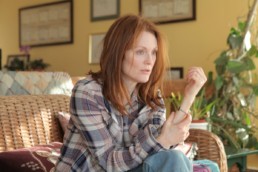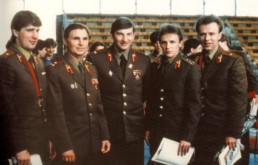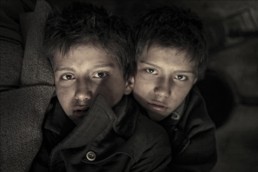Review: 'Punch-Drunk Love'
There’s a common feeling when you start watching a movie on Netflix. As the movie begins, you’re still adjusting the position where you’re sitting, the volume, the brightness. It’s usually a little harder than a movie theater to dive right into a movie. In my own case, when I first watched Punch-Drunk Love on Netflix, I was still just getting into the movie when less than 5 minutes in, a random, chaotic event immediately sucks in your attention. The moment might feel like a gimmick, but from that point forward, you’re going to be engulfed in the movie.
Barry Egan (Adam Sandler, but hold your groans for a moment) is caught up between his deadbeat job and overwhelming pressure from his seven daunting older sisters. He has no connection to anybody and is lonely and confused beyond rational measure, and at times he is prone to violent outbreaks. He tries calling a phone sex line just to feel some sort of human connection, but to no avail. Suddenly, Lena (Emily Watson) enters his life, and for the first time he begins experiencing love and human connection but has no idea how to handle it.
Rather than getting too caught up in reality, the film flows with a poetic, fantastical grace. Elements are hyperbolic, but doesn’t everything feel that way when you first fall in love?
Prior to making this movie, director Paul Thomas Anderson made two sweeping, 3-hour-long ensemble pieces, Magnolia and Boogie Nights, both hailed as master works. Having maxed out his energy on that type of movie, he challenged himself to create the exact opposite: a 90-minute movie with essentially 2 characters. Rather than getting too caught up in reality, the film flows with a poetic, fantastical grace. Elements are hyperbolic, but doesn’t everything feel that way when you first fall in love? This is a classic example of the rare film that is style over substance, yet succeeds in gripping your emotions. Rather than pretending that the audience doesn’t already have an opinion on Adam Sandler (positive or negative), Anderson recognizes the actor he is working with and utilizes it, playing up Sandler’s zany caricature to express the frustration inside of him. There is no better sign of a master director than one who can take any actor and mold an iconic performance from them. This is just one example of how much the film defies expectations, and throughout the movie, we take twists and turns both in story and in style, but we are rooted in a passionate love story to stronger heights than most romantic films reach taking a conventional approach.
I have returned to this film multiple times as I’ve grown up myself. It’s short enough that it doesn’t require the same commitment many great movies demand to watch, one of the reasons it’s perfect for a Streamable Sunday. Instead, its simplicity matched with its unconventionality are so captivating and intriguing, and like a Rorschach picture means something different to anyone. Personally, I am hard pressed to find a romantic film that had a more moving impact on me. This is one of the first films that I ever streamed on Netflix. Today, it remains one of the absolute best.
https://www.youtube.com/watch?v=VNeZi1y_v88
Review: 'Still Alice'
Alzheimer’s is a disease associated with old age and years beyond the golden years, so when renowned professor 50-year-old Alice (Julianne Moore) finds her day-to-day memory occasionally failing her, she has reason to be alarmed, and her worst nightmare is all but true.
The film takes a few unique choices, mostly in what parts of her mental crippling it chooses to show and the ones that it omits. There is a lot to be said about Julianne Moore, whose performance is so natural and smooth that it feels more like watching a relative than watching a major movie star. She controls every scene of the movie, notably a showstopper about 2/3 of the way into the film that evokes emotions in everyone regardless of your experience with Alzheimers.
It’s frustrating how flat and generic everyone else seems next to Julianne Moore. One exquisite performance can only carry the movie so far.
Beyond her performance, however, there is little to say about the film. It doesn’t aim to tackle very much and leaves all of the supporting cast, including Alec Baldwin, Kristen Stewart, and Kate Bosworth with one-dimensional characters who are little more than their two-word descriptors (aspiring actor, tenured professor, expecting mother). In fact, it’s frustrating how flat and generic everyone else seems next to Julianne Moore. One exquisite performance can only carry the movie so far.
Overall, the film is not particularly challenging or covers any new material. It will illicit emotion given the subject matter of the film, and it doesn’t do anything poorly. Instead, it just left me feeling like there could have been much more substance and story beyond this one particular life event. While Julianne Moore will certainly be an Oscar nominee and may even find herself with a victory, there are no other elements of the film that I see as being outstanding or worthy of recognition.
https://www.youtube.com/watch?v=ZrXrZ5iiR0o
Review: 'Red Army'
When the word documentary is used, the assumption is that it will be boring or serious, but in the case of Red Army, neither is entirely necessary. Nearly everyone is familiar with the movie Miracle and perhaps aware that it depicts an underdog story about the US overcoming the menacing Soviet Union in a winter Olympics. Red Army asks, and subsequently answers, “What if the other side of the story was even more interesting?”
The primary subject of the film is Slava Fetisov, who was captain of the Red Army Soviet Union hockey team. Starting out as a determined young boy and going all the way up to where he is today, his hockey career is nothing short of incredible. His interviews anchors the film tremendously with a great mixture of humor, emotion, and overall willingness to share his life experience. As Fetisov goes through his personal history, we see the parallel story of the Soviet Union as a whole, and he is the perfect representative of what the Soviet experience was like at that time. The reason the film works so well is because hockey is a narrow enough subject to dive into, but because of the value and the cultural connection hockey has to the Russians and former Soviets, it helps make sense of bigger political messages.
The reason the film works so well is because hockey is a narrow enough subject to dive into, but because of the value and the cultural connection hockey has to the Russians and former Soviets, it helps make sense of bigger political messages.
It’s rare that a film covers a serious topic without turning it into something drab, but Red Army manages to find fun within the entire story, in large part due to Fetisov’s off-beat interpretation of the interview questions and occasional language barrier. The film is also strongly boosted by the sport of hockey itself and a mass of great archive footage strung together to remind you how exciting this sport is. It also manages to educate about the difference between the Soviet and American hockey styles and why one was more successful, without coming across as a coaching video.
Overall, the film feels incredibly well put together, covering an ideal scope of material and still representing something larger. It is informative, engaging, funny, and even at times quite heartfelt. Red Army is not an attempt to celebrate the Soviet Union, nor is it saying how awful of a republic it was. Instead, it takes the people, like Fetisov, and shows just that: they are individuals with emotional range just like us, and they have a story worth listening to. I just found out that this film won the audience award at AFI Film Festival, where I saw it. I am not remotely surprised; above all else, this is a film that was meant to be entertaining and worth viewing for all.
https://www.youtube.com/watch?v=a_euhvZQMaw
Review: '21 Years: Richard Linklater'
Richard Linklater is a director whose name has not become widely recognizable in the likes of Spielberg, Tarantino, or the Coen Brothers, but for anyone who studies film, he is a humble visionary whose eclectic filmography is truly that of an individual. With Boyhood on its way to Oscar recognition, the hope appears that his name will become more recognizable, and 21 Years: Richard Linklater is a collective tribute to the man behind such a variety of movies.
The inner workings behind many of Linklater’s films are gone through one by one as his favorite actors, many of whom he helped put on the map, reminisce in an interview about working with him. Ethan Hawke, Matthew McConaughey, Jack Black, and many more all have nothing but praise for their numerous collaborations with the director. Indeed, the film is inspiring to anyone who has dreamed of making movies in the same way that watching special features on a DVD used to be: it unmasks the wonder. In its brisk 78 minutes, the film is nothing more than interviews and clips of movies, mixed in with a few animated transitions for those with a short attention span. It behooves you to have seen the following Linklater films that are highlighted: Dazed and Confused, the Before trilogy, School of Rock, The Newton Boys, A Scanner Darkly, Bad News Bears, Me and Orson Welles, Bernie, and ending with Slacker, the micro-film that got the engine running for both Linklater and modern independent cinema. If you haven’t seen any of these, this movie will serve you no good, and the more you have seen the more you can get out of it. The film also dips into his contributions to the Austin Film Society, which definitely could have been extended as it potentially is a powerful tale in and of itself.
Indeed, the film is inspiring to anyone who has dreamed of making movies in the same way that watching special features on a DVD used to be: it unmasks the wonder.
It’s a niche film, but as a big Linklater fan myself, I can’t deny my shared thorough inspiration from the director that all his peers have. If you are a lover of film, it certainly would be worth your time to check out his filmography. Especially with Boyhood now in release, it gives it a perspective. Some say it is his masterpiece, but I stand by Before Sunrise, Before Sunset, and Before Midnight as a perfect trio of films and quintessential Linklater. Either way, I still have more of his movies to see myself, and this film serves as a reminder that even his less acclaimed movies are not a waste of your time.
This documentary never aspires to stand next to these movies as an equal, but to honor them and the man who put them together. In no way does it care to be as innovative as any of them, but it instead shows just how much work Linklater has done, all the while maintaining a truly unique yet humble vision. It’s an enjoyable love letter to the writer-director and anyone who views it will glimpse the unique contribution to cinema that has come from this man’s filmography.
https://www.youtube.com/watch?v=DpnJC_ZUhOs
Review: 'Interstellar'
We’re in an era where cinema and media is heading toward smaller venues, with emphasis on Netflix and other small screen content. While so many high profile directors are turning their back on grandiose movies, writer/director/producer Christopher Nolan is still keeping the embers burning. And with Interstellar, Nolan’s follow-up to the legendary Dark Knight Trilogy, he reminds the audience that “quality blockbuster” does not have to be a paradox.
Two things I’ll share about my experience watching this film: first, I went in knowing as little as possible. The less you know the better - I will thoroughly respect that in this article. Secondly, I saw it in 70mm IMAX. Like The Dark Knight Rises, I find it difficult to imagine seeing this movie in any other venue: it takes full advantage of the massive ratio. There is no gimmick: every foot of the frame feels utilized in some shots, and in other moments the mass scale simplicity of these mega spatial images is an all-engulfing experience. One particular shot from the first half stands out in my mind, which out of context is almost completely surreal, but within the narrative is fully engrossing. Moments of the film even feel like the Space Station IMAX movie that came out in the early 2000’s. If you have to be persuaded to see the film in IMAX, you may not know what you’re missing: there are no other working filmmakers who respect the potential of the massive screen the way Nolan does.
[Interstellar ] fits snugly between Inception and The Dark Knight in the Nolan canon as a modern blockbuster classic worthy of acclaim, and is undoubtedly the most emotionally charged project he has accomplished to date.
While the big points of the film are in space, what makes it work so well is how grounded the film is. We meet Cooper (Matthew McConaughey), a single father whose dream career as a space pilot was terminated after Earth’s resources began running out (the environmental component is only enough to get the story going), forcing him to be a farmer in a modern Dust Bowl. As you can imagine from the title, a turn of events brings him at the help of one big mission: to find hope for humanity deep in space.
In order to take this dream mission, he has to make the gut wrenching decision of leaving his children behind. The antagonist of the film is actually time itself: the longer and further we go into space, the harder it will be for the characters to ever return home. If you doubted that McConaughey deserved his Oscar last year, your skepticism will be silenced: here we see both a movie star and a driven actor, and his performance carries the film’s entire weight. Through his performance the film has emotional material that is rare for a blockbuster. The thought of missing out on precious time with loved ones is heart-wrenching for anyone, and while the long journey and risk of never returning has always been a touchstone of space adventures, never before have these heartstrings been pulled so poetically.
Along with the emotional weight of the film, the journey is loaded with surprises and pure fun as a good blockbuster should be. Over the three hour runtime, the film expertly balances heavy science and actual quantum physics without completely alienating the audience, and keeps us on the edge of our seat with tension and suspense, no small feat. Some suspension of disbelief is needed at first, but once in space, the movie’s logic holds up enough to enjoy the entire film. By an hour in, the scenario is gripping enough to sustain the rest of the movie, thanks to the combination of some well-placed thrills equally matched with the emotional component. With that balance, it’s hard to imagine a more satisfying cinematic experience than Interstellar. Regardless of if you think it’s a masterpiece, this is a film that begs to be discussed, picked apart, and analyzed. It may not become the definitive Nolan film that hype led it to believe, this fits snugly between Inception and The Dark Knight in the Nolan canon as a modern blockbuster classic worthy of acclaim, and is undoubtedly the most emotionally charged project he has accomplished to date. For all film fans, Nolan is a legend, and his prowess here continues. Like the space explorers in this film, one cannot help but hope for more in the future.
http://www.youtube.com/watch?v=0vxOhd4qlnA
Review: 'My Old Lady'
Based on a play by the film’s writer/director, My Old Lady follows Mathias (Kevin Kline), a penniless and depressed New Yorker, who's just inherited his father’s beautiful Parisian apartment, or so he thinks: when he arrives he discovers it is inhabited by 90-year-old Madame Girard (Maggie Smith) under a viager contract, meaning that until the old woman dies, he has to pay her a month sum, an old-fashioned system only known to France. Drama and comedy ensues as the odd couple temporarily reside together, along with Girard’s middle-aged daughter Chloé (Kristen Scott Thomas).
About a third of the way into the film, more about the apartment is revealed along with Madame Girard’s history, forcing the protagonists to come to terms with their pasts and decide how to best move forward. Once this shift occurs, the film swiftly transitions from carrying the light-hearted charm of the old lady to covering some serious personal struggles that the characters face. While the film is about middle-aged and elderly people, the primary topic is coming to terms with resentment toward parents, as each of the characters has lived with angst over all the pain that their parents thrust upon them.
While it certainly will not be the most moving drama of the year, My Old Lady connects with audiences easily by dissecting real and authentic familial issues.
It’s clear from the film’s setup that this is closely based on a play. There are a handful of added scenes that take place outside of the apartment, but even a casual observer won’t find it hard to notice that all of the key dramatic points happen within the confines of the French flat. While the painful situations that the characters have faced feel authentic, the unraveling takes a little longer than what would be best fit, both in screen time (the film clocks in just shy of 2 hours) and in movie time (you’d think that the characters would have faced these demons before reaching their fifties). This is a case where most of the dramatic dialogue between the three protagonists play a little over timed and start to feel redundant. That is not to say that each actors don't work well with the material. Kline is the focal character, and while some of the outrages feel melodramatic (likely better suited for the stage), he still feels comfortable within the role. Maggie Smith starts out as mere comic relief, but as the story goes on her character carries more dramatic intrigue than actual humor. And Kristen Scott Thomas, who has given a number of terrific performances albeit not in widely-seen commercial films, carries a fragile performance with grace and rich emotion.
While it certainly will not be the most moving drama of the year, My Old Lady connects with audiences easily by dissecting real and authentic familial issues. It will especially carry weight among older audiences, who will lavish at Maggie Smith’s fun yet balanced performance. How the film plays at Toronto Film Festival will determine if the performances are viewed as Oscar prospects, but personally I don’t see this film going that route. Regardless, the film is full of charm and fulfills what audiences will expect from the premise.
https://www.youtube.com/watch?v=Ck35r6E4VRM
Review: 'The Longest Week'
Ignoring the actor billing, The Longest Week centers around Jason Bateman as Conrad, who is essentially the antithesis of his famous character from Arrested Development – this time, he’s the one living off of his family wealth. He’s a 40-year-old who hasn’t worked a day in his life and struggles to find any meaning within it, given his skewed life perspective and general loneliness. His only friend is a similarly well off character, Dylan (Billy Crudup), and their relationship is filled with envious banter. Everything changes when they both fall for the same woman, Beatrice (Olivia Wilde), and over the course of one week (hence the title) we see as the love triangle rapidly shifts in various directions.
It’s clear that there is a great deal of films that this movie aspires to be within the wheelhouse of affluent protagonists reaching human epiphanies. The Royal Tenenbaums immediately comes to mind, especially given the emphasis on the narrator: both feature a non-character voice over to give them a more literary feeling. Even many elements of Woody Allen films such as Manhattan and Annie Hall come out in this movie. But unlike all of the films that it emulates, The Longest Week feels as shallow as its protagonist, who similarly strives for greatness in his writing, but lacks the drive or humanity to accomplish greatness. Rather than developing the characters organically, the film relies heavily on expository narration, which gives the scenes themselves significantly less impact.
Rather than developing the characters organically, the film relies heavily on expository narration, which gives the scenes significantly less impact.
That being said, there is nothing that is indigestible about this film. All of the performances are solid but almost certainly side projects for these big names, and at a brisk 85 minutes, nothing protrudes as severely bad. In fact, there are glimmers of hope that give the movie some authenticity. As the relationship between Conrad and Beatrice develops, some universal emotions of early love are displayed well. Yet most are sadly weighed down by the rest of the movie.
If anything, the movie feels extremely self-aware: toward the end of the film, Conrad publishes a book, and the criticisms of his writing are nearly identical to the easy criticisms of the film. What this means is not exactly clear, but it indicates that there’s a level of self-awareness with this project. There isn’t too much else to say with this film: it is by no means poorly constructed or bad quality, but it falls far beneath any benchmark of comparable films, both in the story and for these well-known actors.
https://www.youtube.com/watch?v=Qwu51SYfQQs
Review: 'The Notebook' ('Le Grand Cahier')
In 1944 Hungary, in the midst of World War II, two identical, inseparable twin boys are sent by their mother to the far countryside to avoid the dangers of war. They are sent to their grandmother (Piroska Molnár), a tough, vicious old woman who is known as the town witch. She is outraged that she is stuck with the boys, referring to them only as “bastards” and beating them daily. Despite their mother’s intention of protecting them, the boys are inevitably exposed to the horrors of war, and the twins decide to make themselves immune to suffering by taking drastic actions, including beating each other up and starving themselves, all in the name of becoming emotionally tough in the drama The Notebook ('Le Grand Cahier').
The film is an exploitation movie disguised under the veil of foreign World War II drama.
The synopsis of The Notebook is essentially a set-up to create as many disturbing situations as humanly possible in a two-hour film. Nearly any scenario possible to make an audience horrified is included: pedophilia, murder, starvation, anti-Semitism, rape, abuse of power, bombings, you get the idea. And what is all this trying to prove? Essentially nothing, other than it is awful to watch, which we could have easily guessed without enduring ourselves to this. There is no story, no tension, just a series of set-ups for sadistic circumstances. I understand that war is a horrific thing and has a massive ripple effect. Violence in movies is usually meant to serve a purpose in moving the story forward, or possibly commenting on a larger theme. Here we get neither, and by the halfway point, the film becomes absurd trash, as numerous side characters meet gruesome scenarios with no real purpose.
There is no saving grace to this film. The story is an absolute mess, the characters are unsympathetic. The film is an exploitation movie disguised under the veil of foreign World War II drama. As much as I am an advocate for foreign films, and despite my personal affinity for the country of Hungary, I must advise strongly that you spare yourself the misery of this nightmarish film.
https://www.youtube.com/watch?v=RIDVFkghoEs








